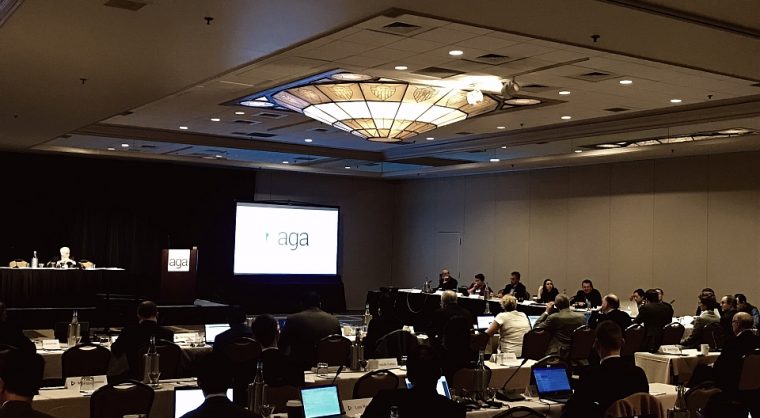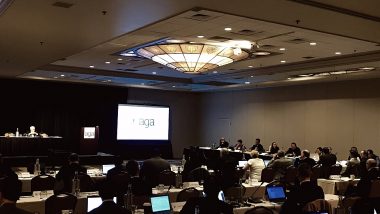Washington, DC (Dec. 4, 2018) – While the rates of colorectal cancer are dropping every year thanks to early detection and removal of pre-cancerous polyps, it remains the third leading cause of cancer-related deaths in men and women in the U.S. In response to the need for even more effective screening, the American Gastroenterological Association (AGA)’s Center for GI Innovation and Technology this week convenes clinical experts, industry and regulators to explore the current barriers and critical next steps to improve colorectal cancer screening and surveillance.
“This is a retreat of many of the foremost thought leaders in colorectal cancer screening and prevention. We will spend two days evaluating how we screen patients now and asking how we can push ourselves to do even better. Artificial intelligence, emerging endoscopic technologies, the microbiome and diagnostic markers are all on the table for discussion,” says V. Raman Muthusamy, MD, MAS, AGAF, chair of the AGA Center for GI Innovation and Technology and professor of clinical medicine at the University of California, Los Angeles.
As part of AGA’s commitment to bringing together clinicians, researchers, industry and regulatory bodies to improve digestive health, this meeting will focus on four aims:
- Identifying gaps in the current practice of colorectal cancer screening, surveillance and treatment.
- Identifying new innovations that may have a role in improving colorectal cancer screening and surveillance.
- Understanding where innovation is still needed to effectively screen for colorectal cancer.
- Defining the appropriate clinical studies needed to validate new colorectal cancer screening modalities.
The closed meeting will result in consensus recommendations and paper(s) that will provide direction to innovators, research teams, industry and regulators. Publications and related education are expected in 2019.
Faculty
Mark Antonino, MS, Food and Drug Administration
John A. Baron, MD, University of North Carolina at Chapel Hill
Robert Bresalier, MD, University of Texas MD Anderson Cancer Center
Kristen Burke, MD, Massachusetts General Hospital
Carol Burke, MD, Cleveland Clinic
Michael Byrne, MD, Vancouver General Hospital
Neelendu Dey, MD, Fred Hutchinson Cancer Research Center
Jason Dominitz, MD, University of Washington School of Medicine
Martin Golding, MD, Food and Drug Administration
William Grady, MD, Fred Hutchinson Cancer Research Center
Thomas F. Imperiale, MD, Indiana University Medical Center
Steven Itzkowitz, MD, Icahn School of Medicine at Mount Sinai
Charles Kahi, MD, Indiana University Medical Center
Michael Kochman, MD, University of Pennsylvania Health System
Sri Komanduri, MD, Feinberg School of Medicine Northwestern University
Uri Ladabaum, MD, MS, Stanford University School of Medicine
Joanna Law, MD, Virginia Mason Medical Center
Jeffery Lee, MD, Kaiser Permanente San Francisco
Herb Lerner, MD, Hogan Lovells US LLP
David Lieberman, MD, Oregon Health and Science University
Joseph Lim, MD, Yale University School of Medicine
Xavier Llor, MD, Yale University School Medicine
Joshua Melson, MD, Rush University Medical Center
V. Raman Muthusamy, MD, David Geffen School of Medicine at UCLA
Heiko Pohl, MD, Geisel School of Medicine at Dartmouth
Linda Rabeneck, MD, MHP, Cancer Care Ontario
Robert E. Schoen, MD, University of Pittsburgh School of Medicine
Aasma Shaukat, MD, University of Minnesota Medicine
Brennan Spiegel, MD, Cedars-Sinai Health System
Shahnaz Sultan, MD, University of Minnesota Medical School
Thomas D. Wang, MD, University of Michigan
Andrew Wang, MD, University of Virginia Health System
Judy Yee, MD, Albert Einstein College of Medicine
AGA thanks the corporate sponsors of this meeting, which will not participate in the consensus or education materials. This program is supported by: Aries Pharmaceuticals, Inc.; Boston Scientific Corporation; Clinical Genomics Pathology Inc.; COOK MEDICAL LLC; Exact Sciences Corporation; GI Supply; Medtronic; Motus GI Holdings, Inc.; Olympus America; PENTAX Medical; Virgo Surgical Video Solutions, Inc.
About AGA
The American Gastroenterological Association is the trusted voice of the GI community. Founded in 1897, AGA has grown to include more than 16,000 members from around the globe who are involved in all aspects of the science, practice and advancement of gastroenterology. The AGA Institute administers the practice, research and educational programs of the organization. www.gastro.org.
Like AGA and Gastroenterology on Facebook | Twitter @AmerGastroAssn |
Check out our videos on YouTube.
The AGA Center for GI Innovation and Technology supports innovation and the development of new technology in gastroenterology, hepatology, nutrition and obesity by guiding medical device and therapeutics innovators through the technology development and adoption process. http://bit.ly/AboutCGIT













